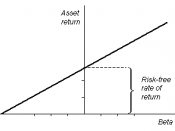Efficient Market Hypothesis
The efficient market hypothesis (EMH) is a belief that financial asset markets are fully efficient and thus correctly reflect all information. It evolved in the wake of work by Kendall (1953). He found price seemed to follow random walks, so that future price changes could not be predicted on the basis of past prices. The importance of news for asset prices led to the idea of the EMH.
Definition
The efficient markets hypothesis (EMH) holds that a stock market is efficient if the market price of a company's shares (or other financial securities, such as bonds), rapidly and correctly reflects all relevant information as it because available. (Lumby & Jones, 1999) In a truly efficient stock market, if all information turned out to be entirely reliable and complete, share prices could be relied upon to correctly reflect the true economic worth of the shares.
For a market to be efficient, three assumptions are needed, as shown below.
1. All information relevant to financial asset prices must be costlessly, widely and quickly available. In information is costly to secure, or is known only to some investors, or spreads slowly, then asset prices might not reflect all information.
2. There must be no transactions costs in purchasing or selling financial assets. Otherwise, if news arrives that leads people to believe that some assets are more attractive, then their price may not rise to reflect this because the transactions costs involved in buying them could outweight the gains that might be made.
3. Investors must act rationally on the information they have, for otherwise asset prices will not correctly reflect available information.
(King,1999)
Levels of market efficiency
Before discussing why the concept of market efficiency is important for financial managers, some questions must be answered. If stock markets are so...


